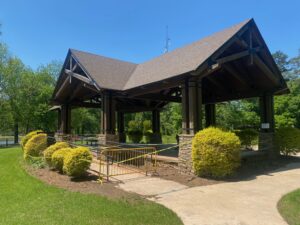Peachtree City residents won’t see a property tax increase this year, as the city’s $27.7 million budget for 2011-2012 has been adjusted to eliminate a slight millage rate increase.
That reality means that some residents’ tax bills may go down, but all that is dependent on the value of each individual home.
The changes added by staff will also increase the end-of-year cash left over for the city’s reserves by some $261,183 to a total of $1.09 million.
At Monday’s workshop meeting of the City Council, Finance Director Paul Salvatore explained that city staff also have cut $50,000 from the projected expenditures for legal services to move it in line with what was spent this year, and also that one new police car was trimmed from the proposed fleet of 10 to purchase this year.
The budget changes from staff also included replacing a full-time employee at the Kedron Fieldhouse with three part-time workers.
The budget contains more than $250,000 in savings expected from further staff reorganization later in the fiscal year, Salvatore added.
Councilwoman Kim Learnard, said she was very impressed with what the city has been able to accomplish with the budget, the first one from new City Manager Jim Pennington.
“We’re not increasing taxes, we’re maintaining services, working harder and smarter and we’re adding to our general fund,” Learnard said. “I think this is a very, very positive result of Dr. Pennington and Paul Salvatore putting in hundreds of hours of work, and I know (Councilman) Eric (Imker) put in a few hundred hours himself. … This is impressive. I am blown away.”
But if this year’s budget process has seemed a breeze compared to last year, you wouldn’t know it by some of the heated discussions among council members and Mayor Don Haddix at the meeting.
When talk turned to budget cuts, Haddix said he felt the city needed to look at moving to fee-based services for recreation and other city services to remove the necessity for so much tax funding. Councilwomen Vanessa Fleisch and Kim Learnard asked for the specifics of that proposal.
“Now’s the time,” agreed Councilman Eric Imker.
Haddix replied that every time he brings the matter up, it is not supported by the rest of council.
Imker then suggested that Haddix provide specific proposals for the rest of council to consider.
“Then we can make an informed decision about the impact on the budget,” Learnard added.
At the very beginning of the meeting, Haddix reminded council that it was only voting on the budget for the 2011-2012 fiscal year, and not on budgets for future years.
That touched off a philosophical discussion about the value of the city’s five-year budget modeling, which is used to show how future budgets are predicted to shake out and any potential need for a budget increase.
Learnard said while everyone agrees that the budget vote is only for this year, it was important for the city to look down the road five years to see where it’s going financially.
Haddix said the five-year plan, however, consisted of “projections” and that they did not lock the city into spending decisions, since any future council can take nearly any budgetary direction it wants.
A few minutes later, Learnard ended the discussion.
“Well, I’m going to tell you if we decide we are not here to plan then we deserve to go broke,” Learnard said.
Later in the meeting, Imker proposed several additional cuts for the budget, acknowledging that he might not have the support of his fellow council members for all of them. Among those cuts was a $100,000 trimming of the city’s plan for a one-time bonus for all city employees equivalent to 2 percent of their salary. That cut would bring the amount down from $240,000 to $140,000.
He also suggested another $162,000 in cuts, half of which would come from departmental contingency funds and the rest from reductions in volunteer firefighter stipends ($10,000), small tools and equipment ($24,000), the public improvement program contingency ($35,000), dues and fees ($8,000) and books and periodicals ($4,000).
Add all that to a projected savings from bond refinancing at $162,000 and the projected sale of a cul-de-sac on Newgate Road to a senior apartment development that completely surrounds it, and the total positive impact on this year’s budget would be $569,000.
Haddix said he wanted the details of how the cuts proposed would affect the city, especially in terms of road and cart path maintenance. Imker had proposed shrinking that figure from $2 million to $1.5 million, a figure that’s still more than the $1.2 million the city is projected to end this year in that category, he said.
“I’m not saying it’s bad to go from two to one and a half (million) on paths, … but if we cut $500,000 can we still do our cart paths?” Haddix said. “… I want to see and understand the actual physical real impact of what it has on the city.”
At that point, Imker accused Haddix of not understanding what the budget is for.
The discussion then devolved into a heated exchange between the two. Haddix at one point asserted: “Just because we disagree doesn’t mean I don’t understand.”
Soon after, Imker mocked the mayor by taking his thick budget binder and placing it over his head, alleging that it was akin to “putting on blinders” and only looking at this budget year instead of trying to discern the impact this year’s budget would have on budgets in future years.
Haddix then accused Imker of making a personal attack, which led Imker to accuse the mayor of doing the same thing in providing “misinterpretation of data” from last year’s budgeting process in a recent newspaper letter.
“When you up and write letters like that, it irritates me to no end,” Imker said.
Haddix replied that even if his stance irritates Imker, both men are entitled to have their own ideas.
Councilman Doug Sturbaum said he also had a list of about $91,000 in cuts to have the city manager look at, including some travel expenses. Imker said he thought Sturbaum’s ideas, which were not discussed in detail, were good and that he felt he could support them.
Imker also recommended a number of long-term cuts, including potential changes to the city’s leave policy to make it easier to administer and also for a projected cost savings of $900,000 over five years. Imker claimed that a first-year city employee was eligible for up to 31 days off in their first year, but those figures were challenged after the meeting as not being completely accurate.
Other long-term cuts Imker recommended included getting rid of the city’s defined contribution plan in exchange for eliminating a $600 per employee increase in employee health insurance premiums that was implemented several years ago. That change would save a projected $250,000 over five years.
Imker also suggested that the city could save $900,000 over five years by revamping the employee evaluation system and changing it from a three-tier system to a two-tier system that has smaller merit salary increases.
In comments from the public, resident Steve Allen urged council to look at how to enhance revenue, just like businesses do every day. He urged council to focus on bringing new jobs to the community.
Resident Tim Lydell urged council to focus on the budget year round, in part by appointing a citizen committee to form recommendations to the city.
Lydell said he has had good experiences in interacting with city employees, and he feels badly about the budget cuts they have endured, because he knows it affects morale.










Leave a Comment
You must be logged in to post a comment.